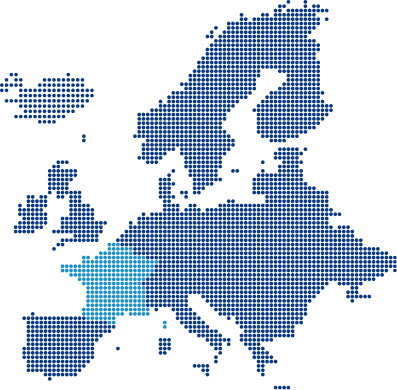ETIAS for France
EU Visa Waiver for U.S. Citizens Visiting France
France is one of the countries most-visited by American tourists. U.S. citizens will soon need ETIAS to travel to France. ETIAS starts in 2026.
As an American, you must apply for travel authorization to visit France and other Schengen countries short-term without a visa. You can register for ETIAS online.
To help you prepare, this page explains the ETIAS requirements for U.S. nationals traveling to France.
Requirements to Visit France from the U.S. Visa-Free
To travel to France from the United States without a visa, you need to meet several conditions.
You must be visiting:
- For tourism, business, or short-term study
- For no more than 90 days per 180-day period

Documents you need to travel to France without a visa
These are the documents you need to visit France without a visa:
- U.S. passport valid for at least 3 months after you’ll exit the Schengen Area
- ETIAS travel authorization for France (starting 2026)
What if I do not meet the visa-free conditions for France?
If you are a U.S. citizen and you are not eligible for visa-free entry (for example you wish to work in France), you need a visa.
French National Visas are issued by the French embassy. You’ll need to contact the embassy and provide the relevant paperwork to apply.
About ETIAS France for U.S. Citizens
You can apply for ETIAS for France starting 2026. The application is 100% online— apply from the U.S. using your mobile phone, laptop, or another electronic device.
Key information about ETIAS France for U.S. citizens:
- Valid for 3 years, or until your U.S. passport expires (whichever is sooner)
- Travel to France multiple times with the same permit
- Spend up to 90 days per 180-day period in France
- Visit other Schengen countries with the same ETIAS authorization
The Benefits of ETIAS France for Americans
ETIAS will make France and the rest of the Schengen Area safer.
- Before ETIAS—only visa-required visitors undergo security screening.
- With ETIAS—all non-EU visitors undergo security screening.
This means around 1.4 potential travelers from across the world will be checked before they enter the Schengen Area, increasing safety for everyone.
Individuals who pose a potential health or security threat can be stopped from traveling to France. The information provided on the ETIAS application is cross-checked against Schengen security databases.
About France
Capital: Paris
Language: French
Area: 643,801 km²
Population: around 67 million
Timezone: UTC/GTM 1
Currency: euro (€)
Code: +33
U.S. Embassy in Paris, France
Address: 2 Avenue Gabriel 75008 Paris, France
Office Hours: Open from 9:00 AM to 3:00 PM
The following cities have U.S. Consulates: Bordeaux, Lyon, Marseille, Rennes, Strasbourg, Toulouse, and Nice
French representations in the United States
You do not need to contact a French embassy or consulate to apply for ETIAS, everything is done online.
If you need a visa for France or require other consular services you can contact the French embassy in Washington D.C. or over 60 other representations across the United States.
FAQs About Traveling from the United States to France
What are the requirements to travel to French overseas departments? Toggle faqs
French overseas departments of French Guiana, Guadeloupe, Martinique, Mayotte, and Réunion are not part of the Schengen Area. ETIAS and Schengen visas are not valid for entry.
If you are planning a trip to one of these overseas departments, you should check the entry requirements based on your nationality. You will either be visa-exempt or need a visa.
Are there direct flights from the United States to Paris? Toggle faqs
Yes, there are several options if you want to fly directly from the USA to Paris. These include flights from New York, Los Angeles, Chicago and San Francisco.
Flights from North America land at Paris Charles de Gaulle Airport (CDG).
Your ETIAS will be verified when your passport is scanned by French border officials on arrival at the airport.
What documents do I need to travel to France from the United States of America? Toggle faqs
To travel to France as a U.S. citizen, you need a passport valid for at least 3 months after you’ll exit the Schengen Area.
For example, if you’ll leave Europe on August 1, your U.S. passport must be valid until at least November 1.
If you’re eligible for visa-free travel, you do not need additional documentation. From 2026, you’ll need ETIAS linked to your passport.
If you need a visa for your trip, you must carry your valid visa together with your passport.
Which countries near France can I visit with ETIAS? Toggle faqs
U.S. citizens can visit any of the countries in the Schengen Area with ETIAS. The Schengen Area includes Germany, Italy, and Spain, 3 of the countries that border France.
You do not need a separate ETIAS for each European country you visit. ETIAS is valid across the Schengen Area—there are no internal border checkpoints.